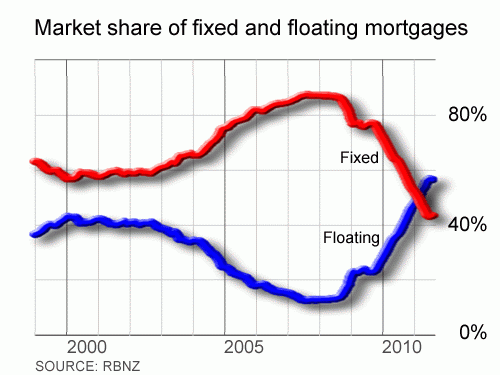
By Gareth Vaughan
The rise and rise of floating, or variable, rate home loans by value stalled in August, dropping month-on-month for the first time in 24 months.
The latest Reserve Bank data shows NZ$95.463 billion worth of home loans were floating as of August, down NZ$526 million from July. It's the first monthly fall since a NZ$661 million drop in August 2009 to NZ$36.782 billion.
The end, temporary or otherwise, to the rise of floating mortgages ends a strong swing away from fixed-term home loans. As recently as January 2008, 87% of home loans by value were on fixed-term rates. Now, 56% of home loans by value are floating, down from 57% in July.
The July figures were both the highest percentage and highest dollar amount floating since Reserve Bank records began 13 years ago and the rise of them came during a period when floating rates have been lower than fixed rates. The major banks are still advertising floating rates below 6%, which is lower than their cheapest fixed-term rates. See all mortgage rates here.
The August dip came as some economists - including the BNZ's Tony Alexander - were suggesting the Reserve Bank was likely to raise the Official Cash Rate (OCR) on September 15 and it was time for floating rate borrowers to fix. Ultimately the Reserve Bank left the OCR unchanged at 2.5% in September.
And on August 3, ASB hiked its one to five year fixed-term home loan interest rates by between five and 40 basis points following an increase in wholesale interest rates before cutting all bar its 18 month rate by between 25 and 35 basis points just five days later, giving it some of the lowest fixed rates on offer, on the heels of global financial market turbulence. CEO Barbara Chapman told interest.co.nz at the time that ASB had jumped two days too soon.
The switch from fixed to floating has been good news for the banks' bottom lines, with the big four - ANZ, ASB, BNZ and Westpac, all recording margin increases.Banks do better out of floating mortgages because the margin between the variable rate and short end of the yield curve, such as three month bank bills, is higher than the margin between the swap rate and fixed rate mortgages.
It has also been good news for the Reserve Bank's monetary policy power. The central bank's ability to control consumer spending and inflation through OCR hikes is also boosted by having more people on floating mortgages. Because the OCR's biggest influence is on short term interest rates, a hike or cut in the OCR quickly flows through to floating interest rates. A borrower on a floating mortgage is, for example, generally hit by a 25 basis point hike when the Reserve Bank lifts the OCR by the same amount. This means the borrower is forced to spend more on interest payments, giving them less discretionary money to spend elsewhere
Despite the fall in floating loans by value, the number of floating loans continued to increase, rising by 1,516 to 881,048 in August from July whilst the number of fixed-term loans continued falling, down 501 to 492,367.
Meanwhile, separate Reserve Bank data shows the New Zealand dollar value of household deposits held by New Zealand residents closing in on NZ$100 billion after topping NZ$99 billion in August.
Household deposits
Select chart tabs
This article was first published in our email for paid subscribers this morning. See here for more details and to subscribe.
1 Comments
Hi
Sounds off hammers banging in the morning is music to my ears.Means people are starting to spend again.Its been quiet for a couple off years,its very important to keep rates down an get people back into real work.
NZ needs a building boom toget things moving.
Interest rates need to stay around the 6% floating so people can plan ahead.
Put them back up an it would take another couple years before the natives open there wallets.
Build some confidence in the NZ market place is whats needed ASAP.

We welcome your comments below. If you are not already registered, please register to comment
Remember we welcome robust, respectful and insightful debate. We don't welcome abusive or defamatory comments and will de-register those repeatedly making such comments. Our current comment policy is here.